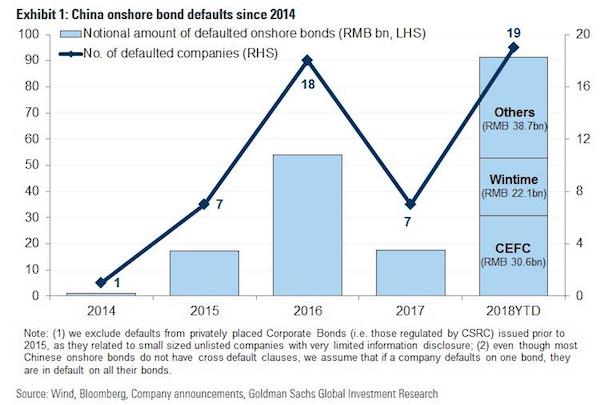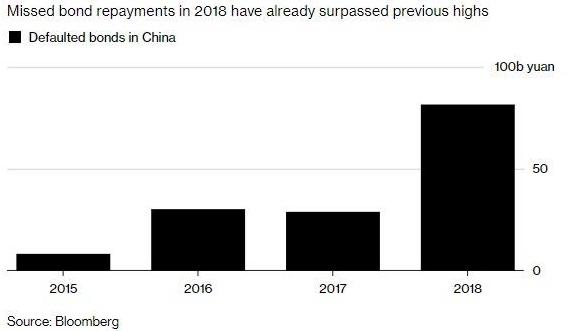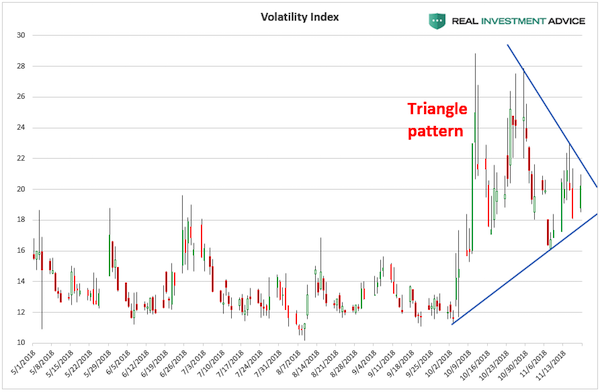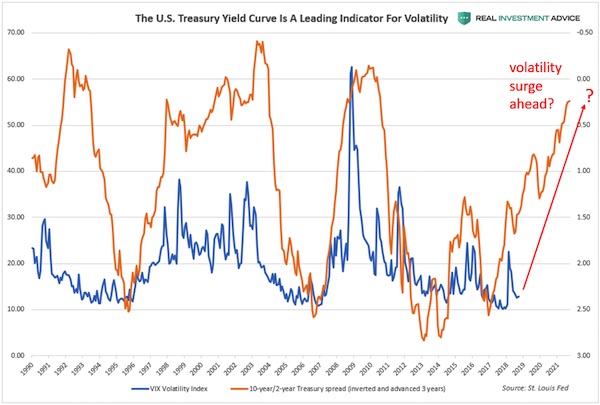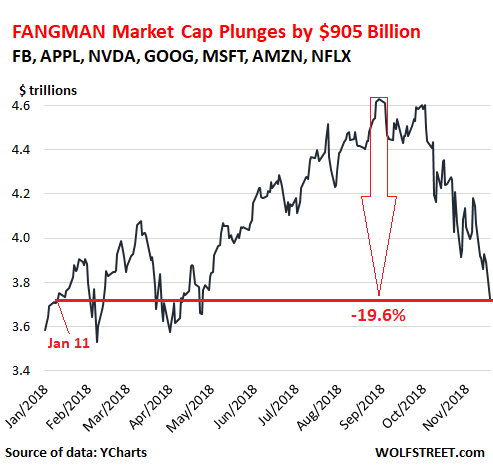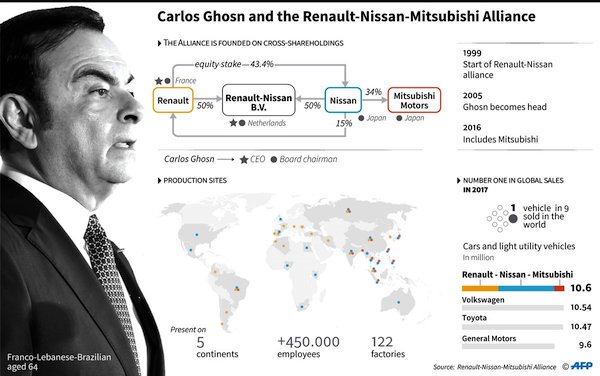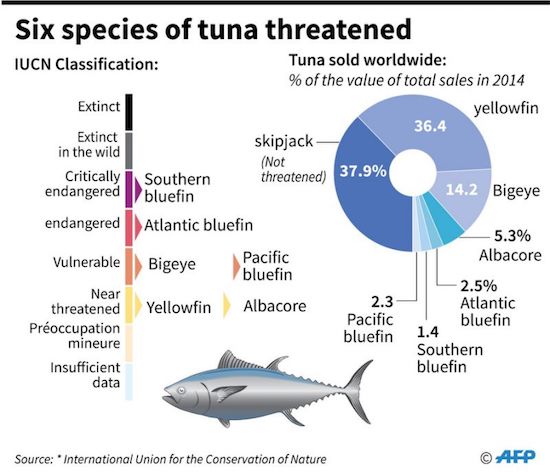
Joseph Mallord William Turner The Sun Rising over Water 1825-30

You really think you can win an election saying this?
• Britain’s Opposition Labour Party Plots Overthrow Of Capitalism (R.)
The British Labour Party’s would-be finance minister, John McDonnell, has a message for the world: he is deadly serious about overthrowing capitalism and building a socialist society. McDonnell, 67, who describes Karl Marx as one of his main influences, has been at the vanguard of a left-wing revival in Britain’s main opposition party under fellow socialist Jeremy Corbyn. He has promised sweeping nationalization, higher public spending and an overhaul of the banking system. Asked about his entry in the Who’s Who directory of influential people which lists his passion for “generally fermenting the overthrow of capitalism”, McDonnell said it was a joke about beer-making, but he agrees with the principle.
“I believe it. I am serious in my intent. I want to transform this economy,” McDonnell told Reuters in an interview. “That means evolving into a system which can achieve that equality, that democracy, that fairness, and tackles the major challenges that we are facing.” With PM Theresa May’s grip on power looking ever more vulnerable as she faces the most perilous crisis of her premiership struggling to win backing for her Brexit deal, Labour are increasingly confident that they will be the next guardians of the world’s fifth-largest economy. McDonnell’s gambit is that the social discontent in Britain which fueled the shock 2016 Brexit vote runs much deeper, and that voters who feel left behind by decades of unchecked capitalism and wounded by years of public spending cuts will rally to his call.
“(It was) like everyone’s grievance went into one vote,” McDonnell said. The polls show that is only part of the picture: voters are tired of economic austerity and unhappy with May’s Brexit negotiations, but Labour are only marginally ahead of the ruling Conservative Party. Some commentators have suggested they should be polling better against a government in disarray. Nevertheless, the combination of an unsated appetite for change and a Brexit-inspired political crisis which has trashed the centrist orthodoxy of British politics, has left Labour confident they will soon win power. McDonnell said his ambition is create the most radical government in modern British history even as the country is grappling with its exit from the EU, the most complex negotiations in Europe since the end of World War Two.
[..] McDonnell has outlined a program of nationalizing the railways, energy and water companies and the postal service, raising taxes on businesses and the wealthy. This would be combined with increased spending on education, skills training, and health care, and harnessing the financial sector to help fund a huge infrastructure investment. At his party’s annual conference two months ago, McDonnell did little to conceal the scale of his ambition. Businesses were stunned by his plan to force all large companies to hand over a tenth of their equity to their workforce.

Possible.
• This Sell-Off is Just One Step in Methodical Unwind of Stock Prices (WS)
It was an ugly Monday and Tuesday followed by a Wednesday that at first look like a real bounce but ended with the indices giving up their gains. This was followed, mercifully, by Thursday when markets were closed, which was followed unmercifully by Friday, during which the whole schmear came unglued again. The S&P 500 index dropped 0.7% on Friday to 2,632 and 3.8% for Thanksgiving week, though this week is usually – by calendar black-magic – a good week, according to the Wall Street Journal: During Thanksgiving weeks going back a decade, the S&P 500 rose on average 1.3%. This leaves the S&P 500 index 1.5% in the hole year-to-date. It’s now back where it had first been on November 30, 2017:
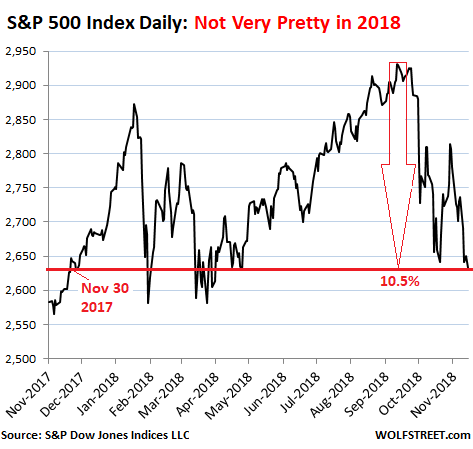
Clearly, when seen over the longer term, the sell-off for now still belongs to the small-fry among sell-offs, with S&P 500 down just 10.5% from its peak:
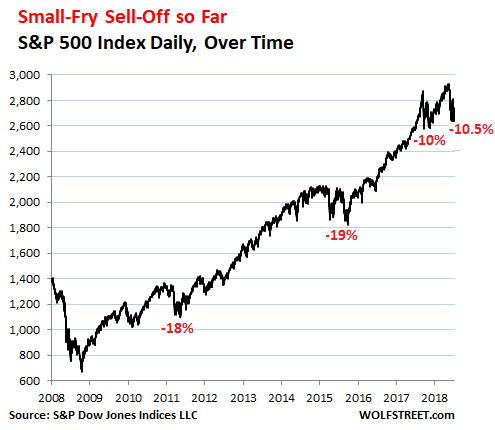
The Dow dropped 0.7% on Friday and 4.4% during Thanksgiving week, to 24,286. It’s 1.75% in the hole for the year. Technically speaking, it’s not even in a correction, being down only 9.9% from its peak. And the Nasdaq, dropped 0.5% on Friday and 4.3% during Thanksgiving week. According to the Wall Street Journal, during Thanksgiving week over the past 20 years, the Nasdaq rose on average 1.3%. So this is no good for calendar-black-magic aficionados. Where’s the free-wheeling holiday spirit? The Nasdaq is now down 14.7% from its peak at the end of August but remains up 0.5% year-to-date. The Russell 2000 small-caps index edged down today and is down 14.5% from its peak on August 31. It’s 3% in the hole year-to-date and right back where it had first been on September 27, 2017:
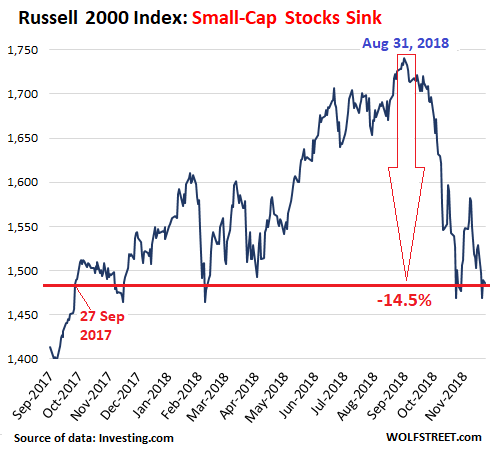
The seven FANGMAN stocks – Facebook, Amazon, Netflix, Google’s parent Alphabet, Microsoft, Apple, and NVIDIA – fell 1.3% on Friday in combined market cap. Over Thanksgiving week, they have now plunged 6.7%, or by $259 billion. Those are real dollars gone in four trading days with just seven stocks. Since their combined market-cap peak of $4.63 trillion at the end of August, nearly $1 trillion — $994 billion to be precise – has dissolved into ambient air, as their combined market cap has plunged 21.5% in ca. 12 weeks. But if you look at them as individual stocks, it’s even worse. The saving grace for the group as a whole was Microsoft, the second largest stock by market cap, which is threatening to become the largest stock shortly if Apple continues to fall at this pace. Three of the seven have already plunged by 38% to nearly 50%. Two more have plunged by 26% to 27%.
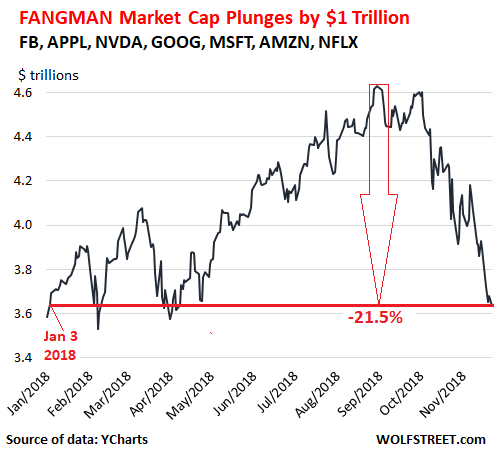

What is it, 34% since the high this year?
• Oil Plunges More Than 6% Despite Potential OPEC Cut (R.)
Oil prices slumped more than 6 percent on Friday, with Brent set for a 12-percent plunge this week, as fears that supply would overpower demand intensified, even as major producers considered cutting output. Oil supply, led by U.S. producers, is growing faster than demand and to prevent a build-up of unused fuel such as the one that emerged in 2015, OPEC is expected to start trimming output after a meeting on Dec. 6. But this has done little so far to prop up prices, which have dropped more than 20 percent so far in November, in a seven-week streak of losses. Deep trade disputes between the world’s two biggest economies and oil consumers, the United States and China, have weighed upon the market.
“The market is pricing in an economic slowdown – they are anticipating that the Chinese trade talks are not going to go well,” said Phil Flynn, an analyst at Price Futures Group in Chicago. “The market doesn’t believe that OPEC is going to be able to act swiftly enough to offset the coming slowdown in demand.” [..] Market fears over weak demand intensified after China reported its lowest gasoline exports in more than a year amid a glut of the fuel in Asia and globally. Stockpiles of gasoline have surged across Asia, with inventories in Singapore, the regional refining hub, rising to a three-month high while Japanese stockpiles also climbed last week. Inventories in the United States are about 7 percent higher than a year ago.
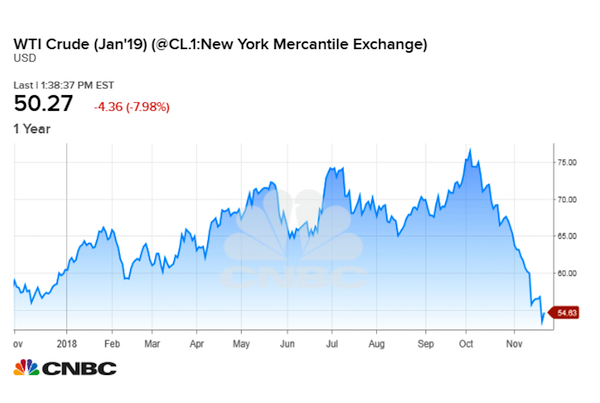

Starting to feel serious.
• Bitcoin Loses 25% Of Its Remaining Value During Thanksgiving Week (CNBC)
Bitcoin continued its move lower Friday, struggling to find footing after a week of pain for the world’s largest cryptocurrency. The digital asset hit a low of $4,119 Friday, according to data from CoinDesk, bringing its seven-day losses to more than 25 percent. In dollar terms, bitcoin’s value dropped by about $1,400 over that time frame. Other cryptocurrencies didn’t hold up this week either. Not a single one in the top 28 by market capitalization was trading in the green Friday, according to CoinMarketCap.com. XRP, the second-largest by market capitalization, fell 6 percent Friday, bringing its one-week losses to 10 percent. Ether was down 7 percent in 24 hours and lost roughly 30 percent for the week.
The total market capitalization for cryptocurrencies fell to $138.6 billion Friday, according to CoinMarketCap data, its lowest level since September 2017. Since its peak, the market has lost about $700 billion in value, according to the data. The tumble for bitcoin started abruptly last week when it fell below $6,000 and hit a new low for the year. The plunge followed what had been a surprisingly calm few months for bitcoin and a break from the rest of its volatile trading year. Since then, prices have hit new 13-month lows and struggled to move out of the $4,300 range. The price dips are a stark contrast from last Thanksgiving when the cryptocurrency was entering a hot streak thanks to a wave of new retail investors. Since that holiday week last year, prices are down by more than 55 percent.

“They never like to ask me for a quote b/c it would kill their story..”
• Trump Dismisses Report He Is Unhappy With Treasury’s Mnuchin (R.)
U.S. President Donald Trump said on Twitter on Friday that he was quite happy with Treasury Secretary Steven Mnuchin’s performance, after The Wall Street Journal reported that the president was dissatisfied with Mnuchin. “I am extremely happy and proud of the job being done by @USTreasury Secretary @stevenmnuchin1,” Trump said in a tweet. The Journal reported that Trump blames Mnuchin for the appointment of Federal Reserve Chairman Jerome Powell, who has been steadily raising U.S. interest rates. Trump is concerned that higher rates could undercut economic gains ahead of his 2020 reelection bid, the newspaper reported.
Quoting unnamed sources, the Journal said Trump has also expressed displeasure with Mnuchin over stock market turbulence and the Treasury secretary’s skepticism about the White House trade actions against China. “The FAKE NEWS likes to write stories to the contrary, quoting phony sources or jealous people, but they aren’t true. They never like to ask me for a quote b/c it would kill their story,” Trump said on Twitter. Trump has repeatedly criticized the Fed’s rate increases under Powell. In October, he called the Fed “crazy,” “ridiculous” and “my biggest threat.”
A year ago when Trump picked Powell to head the Federal Reserve, Mnuchin, a former Goldman Sachs banker, was a strong advocate of his nomination. The Wall Street Journal, citing a person familiar with the matter, said Trump, in a conversation with someone who praised Mnuchin’s performance, mentioned stock market volatility and said: “If he’s so good, why is this happening?”

“..Somehow I doubt that this Christmas will win the Bing Crosby star of approval.”
• Holiday Doings and Undoings (Kunstler)
Somehow I doubt that this Christmas will win the Bing Crosby star of approval. Rather, we see the financial markets breaking under the strain of sustained institutionalized fraud, and the social fabric tearing from persistent systemic political dishonesty. It adds up to a nation that can’t navigate through reality, a nation too dependent on sure things, safe spaces, and happy outcomes. Every few decades a message comes from the Universe that faking it is not good enough. The main message from the financials is that the global debt barge has run aground, and with it, the global economy. That mighty engine has been chugging along on promises-to-pay and now the faith that sustained those promises is dissolving.
China, Euroland, and the USA can’t possibly meet their tangled obligations, and are running out of tricks for rigging, gaming, and jacking the bond markets, where all those promises are vested. It boils down to a whole lot of people not getting paid, one way or the other — and it’s really bad for business. Our President has taken full credit for the bubblicious markets, of course, and will be Hooverized as they gurgle around the drain. Given his chimerical personality, he may try to put on an FDR mask — perhaps even sit in a wheelchair — and try a few grand-scale policy tricks to escape the vortex. But the net effect will surely be to make matters worse — for instance, if he can hector the Federal Reserve to buy every bond that isn’t nailed to some deadly derivative booby-trap.
But then he’ll only succeed in crashing the dollar. Remember, there are two main ways you can go broke: You can run out of money; or you can have plenty of worthless money.

Urban vs rural. Just like in America.
• Rising Fuel Price Protests Should Serve As A Red Alert For Macron (I.ie)
Within the space of a week, the gilets jaunes have managed to tap into wider discontent with Macron’s presidency and policies, gaining opposition support and momentum as a result. These are not the usual protests or strikes co-ordinated by political parties or unions in France. With no official organisation, no identified leader and no political affiliation, the gilets jaunes phenomenon has been almost completely co-ordinated on social media where it declares “[This] comes about only from the French people”. [..] one thing is certain: their actions have chimed with the public. This despite chaos across France last weekend with roads blocked by protesters at some 2,000 locations. Two people were killed – one when a driver panicked and accidentally accelerated their car into the crowd – in the protests and hundreds reported injured.
Nevertheless, a number of polls have shown that almost three-quarters of French voters approve of the demonstrations, one survey found that more than half of those who voted for Macron support them. The planned tax increases – the price of diesel is due to go up another 6.5 cents per litre and petrol by 2.9 cents – are to come into force in January. They follow a 23pc rise in the cost of diesel and 15pc in petrol in the past year. Internationally, Macron has made much of his commitment to battling climate change and these hikes are part of his domestic policies on that front. His ministers have also argued that the higher price of crude globally also necessitates a rise but protesters complain that fuel taxes have been increasing steadily over the past four years.
One survey this week found that 82pc believe Macron should drop the plans. It also showed that particular demographics – the self-employed and business leaders, plus pensioners and low-income households – were most supportive of the gilets jaunes. The episode also highlights the rift between France’s urban elite and those in its poor rural peripheries. Workers who rely on their cars to get to their jobs in the countryside are particularly aggrieved by the planned tax increases.

One more topic they try to push into the limitless future.
• Gibraltar Rocks Final Stages Of Brexit Negotiation (AFP)
Preparations for a summit to endorse Britain’s deal to quit the European Union risked running aground on the rock of Gibraltar Friday, as Spain defended its veto over the fate of the tiny territory. Britain’s Prime Minister Theresa May and leaders of the other 27 EU member states are to meet Sunday to approve their divorce agreement and set a course for negotiating their future post-Brexit relationship. But Spanish officials emerged from talks Friday warning that Prime Minister Pedro Sanchez might not attend unless it is guaranteed that no future accord on EU relations involving Gibraltar will be signed without Madrid’s specific assent.
Visiting Cuba, Sanchez said that if the Gibraltar row is not resolved, he might not go to Brussels on Sunday, warning: “If there’s no agreement, it’s very clear hat will happen, there very probably won’t be a European Council.” In Brussels, Luis Marco Aguiriano Nalda, Spain’s secretary of state for European affairs, said Madrid wanted London to put in writing that it shared Madrid’s interpretation of the negotiated Brexit deal regarding Gibraltar. “We have demanded that it be published by the British authorities before the European Council on Sunday,” he said. In London, however, a Downing Street source said he did not know what document Aguiriano could be referring to and added: “We have negotiated on behalf of the whole of the UK family. That includes Gibraltar and the overseas territories.”

The torture never stops.
• Ecuador Ousts Its London Ambassador, ‘Last Diplomat Assange Knew’ (RT)
Ecuador’s President Lenin Moreno has terminated the credentials of his UK ambassador, who has been at the center of negotiating the fate of WikiLeaks co-founder Julian Assange, as concerns mount over the whistleblower’s safety. The decree, with which Moreno effectively sacked Ecuador’s London ambassador Abad Ortiz, was published by WikiLeaks on Wednesday. The document does not offer any explanation as to why Ortiz, who had been his country’s ambassador to the UK since 2015, is now being permanently recalled. Nor does it name a successor for the outgoing diplomat. The decree is effective immediately.
WikiLeaks tweeted that Abad, appointed to the office under President Rafael Correa, was the last diplomat the long-term self-exiled editor knew in the embassy. “All diplomats known to Assange have now been transferred away from the embassy,” the whistleblowing site claimed. This new and sudden twist in the Assange saga has been met with concern by his supporters, with some suggesting that Moreno is doing Washington’s bidding by removing people who might have stood by Assange and opposed his potential handover to the British police – which is expected to bring about a swift extradition to the US. The dismissal has been called “a silent pro-US coup.”

Best piece on Assange in a while, from Nozomi Hayase.
• Prosecution of Julian Assange, America’s Betrayal of Its Own Ideals (CD)
Just as the Founding Fathers of the United States, by revolting against the autocratic rule of King George were regarded as traitors, by aiding ordinary people expose and defy unjust secret law, WikiLeaks too has been branded as an enemy of the state. Trump’s Secretary of State and the former CIA director, Mike Pompeo calls WikiLeaks a non-state hostile intelligence agency, claiming that the organization threatens American values and needs to be shut down. Members of the US Congress urged the Ecuadorian President to persecute Assange, calling him a “dangerous criminal” and a “threat to global security”. While all these vicious verbal attacks are thrown at him, Assange remains in confinement, over the past months, being completely shut out from the outside, being continually deprived of fresh air, access to medical care and sunlight by the UK government in violation of UN rulings.
All wars start and are fueled by lies and propaganda. Once it was the Vietnam War, where under the command of the US President Lyndon B. Johnson, the Gulf of Tonkin lies unleashed military forces into Southeast Asia. Then came the invasion of Iraq with the former Secretary of State Colin Powell’s speech at the UN, falsely claiming Iraq had ‘Weapons of Mass Destruction’. This battle against free speech is another secret war of this empire. It now has become a fog of war, where with the hype of Russia Gate that was created out of thin air, the public was prevented from seeing who the real enemies are.

Taibbi’s piece is okay, and he says some good things, but he doesn’t appear to like Assange, and fails to hide that.
Valid point he makes: The -secret- charges vs Assange have nothing to do with Trump, they pre-date his presidency by years.
• Why You Should Care About the Julian Assange Case (Taibbi)
It always seemed that Assange viewed his primary role as being a pain in the ass to this increasingly illegitimate system of secrets, a pure iconoclast who took satisfaction in sticking it to the very powerful. I didn’t always agree with its decisions, but Wikileaks was an understandable human response to an increasingly arbitrary, intractable, bureaucratic political system. That it even had to exist spoke to a fundamental flaw in modern Western democracies — i.e. that our world is now so complex and choked with secrets that even releasing hundreds of thousands of documents at a time, we can never be truly informed about the nature of our own societies. Moreover, as the Snowden episode showed, it isn’t clear that knowing unpleasant secrets is the same as being able to change them.
In any case, the institutions Wikileaks perhaps naively took on once upon a time are getting ready to hit back. Frankly it’s surprising it’s taken this long. I’m surprised Assange is still alive, to be honest. If Assange ends up on trial, he’ll be villainized by most of the press, which stopped seeing the “lulz” in his behavior for good once Donald Trump was elected. The perception that Assange worked with Vladimir Putin to achieve his ends has further hardened responses among his former media allies. As to the latter, Assange denies cooperating with the Russians, insisting his source for the DNC leak was not a “state actor.” It doesn’t matter. That PR battle has already been decided.
Courts have held reporters cannot be held liable for illegal behavior of sources. [..] It’s always been the source’s responsibility to deal with that civil or criminal risk. The press traditionally had to decide whether or not leaked material was newsworthy, and make sure it was true. The government has been searching for a way to change that equation. The Holy Grail would be a precedent that forces reporters to share risk of jail with sources. Separate from Assange, prosecutions of leakers have sharply escalated in the last decade. The government has steadily tiptoed toward describing publishers as criminal conspirators.
It’s impossible to know exactly what recent news about an indictment means until we see it (the Reporters’ Committee for the Freedom of the Press has already filed a motion to unseal the charges). If there is a case, it could be anything in the federal criminal code, perhaps even unrelated to leaks. Who knows? But the more likely eventuality is a prosecution that uses the unpopularity of Assange to shut one of the last loopholes in our expanding secrecy bureaucracy. Americans seem not to grasp what might be at stake. Wikileaks briefly opened a window into the uglier side of our society, and if publication of such leaks is criminalized, it probably won’t open again.

Europe needs an enemy. Or rather, NATO does.
• Anonymous Blows Lid Off Huge Psyop In Europe Funded By UK & US (RT)
Anonymous has published documents which it claims have unearthed a massive UK-led psyop to create a “large-scale information secret service” in Europe – all under the guise of countering “Russian propaganda.” In a document dump on November 5, the group exposed the UK-based ‘Integrity Initiative’, said to have been established by the ominously titled Institute for Statecraft in 2015. The main objective is “to provide a coordinated Western response to Russian disinformation and other elements of hybrid warfare.” The Institute for Statecraft is affiliated with the NATO HQ Public Diplomacy Division and the Home Office-funded ‘Prevent’ program, so objectivity is, of course, at the forefront of their work.
Operating on a budget of £1.9 million (US$2.4 million), the secretive Integrity Initiative consists of “clusters” of local politicians, journalists, military personnel, scientists and academics. The team is dedicated to searching for and publishing “evidence” of Russian interference in European affairs, while themselves influencing leadership behind the scenes, the documents claim. The UK establishment appears to be conducting the very activities of which it and its allies have long-accused the Kremlin, with little or no corroborating evidence. The program also aims to “change attitudes in Russia itself” as well as influencing Russian speakers in the EU and North America, one of the leaked documents states.
At present, the vast network allegedly has clusters for Spain, France, Germany, Italy, Greece, the Netherlands, Lithuania, Norway, Serbia, and Montenegro… but there’s more! According to the Anonymous leak, major plans to expand the sphere of influence throughout eastern Europe, the US, and Canada, as well as the MENA region, are allegedly underway. The clusters’ work is apparently done under absolute secrecy via concealed contacts embedded throughout British embassies, the leak claims, some of which are listed as part of the documentation.



